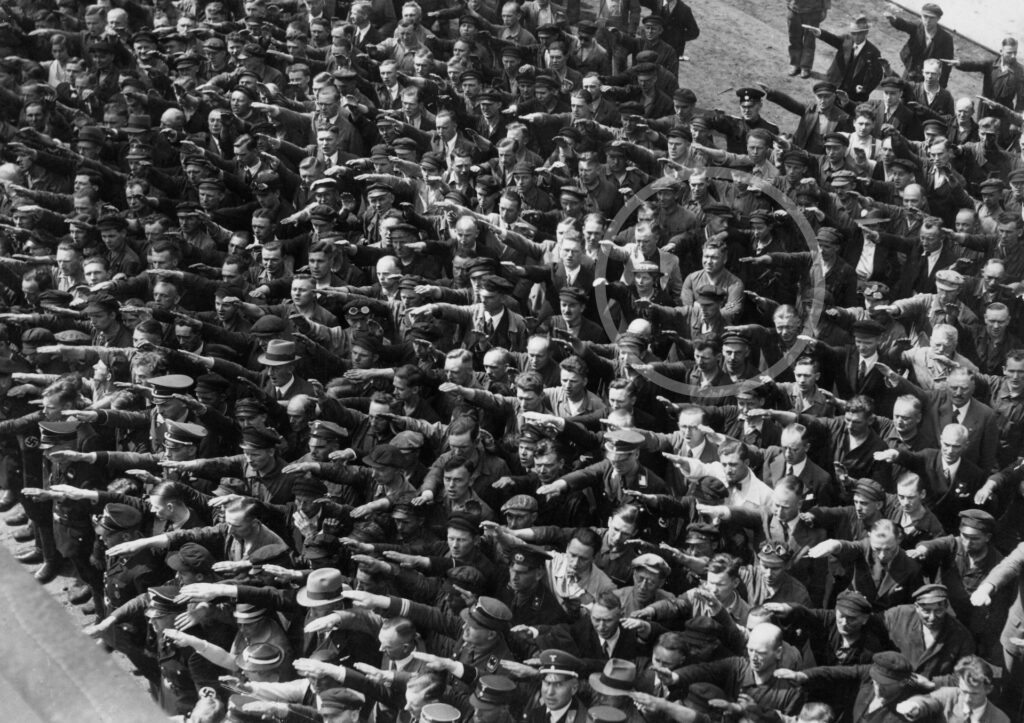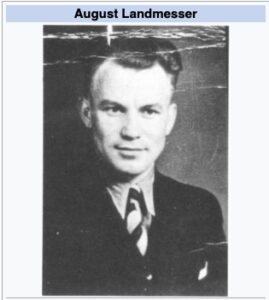I've seen this iconic photo periodically. It has always inspired me. I keep a copy of the image file on my desktop, and I periodically look at it and feel intense emotions. Until today, however, I didn't know the story about the man refusing to salute Hitler. I didn't know what happened to him.
[caption id="attachment_34346" align="aligncenter" width="792"] Employees of the shipyard Blohm und Vow from Hamburg gathered for the launch of the training ship 'Horst Wessel' and demonstrate the Nazi salute with the raised right arm. One worker in the right half of the picture denied it and crosses his arms in a defiant gesture - also a kind of resistance. The name of the worker is August Landmesser., 01.01.1936-31.12.1936[/caption]
Employees of the shipyard Blohm und Vow from Hamburg gathered for the launch of the training ship 'Horst Wessel' and demonstrate the Nazi salute with the raised right arm. One worker in the right half of the picture denied it and crosses his arms in a defiant gesture - also a kind of resistance. The name of the worker is August Landmesser., 01.01.1936-31.12.1936[/caption]
Here is the opening paragraph of the story behind the photo from Wikipedia:
August Landmesser ([ˈaʊ̯ɡʊst ˈlantˌmɛsɐ]; 24 May 1910 – 17 October 1944) was a worker at the Blohm+Voss shipyard in Hamburg, Germany. He became known as the possible identity of a man appearing in a 1936 photograph, conspicuously refusing to perform the Nazi salute with the other workers.[2][3] Landmesser had run afoul of the Nazi Party over his unlawful relationship with Irma Eckler, a Jewish woman. Later he was imprisoned, and eventually drafted into penal military service, where he was killed in action.
The Wikipedia article
continues on and it is a story that is jarring, inexcusable, horrid. This is what can happen when bullies bring terror up a group (or nation) of people, causing them to form a destructive tribe. There are millions of stories of the Nazi regime, but August's photo allows him to visually inspire the rest of us. If only most of us had the guts and integrity to stand up to 1% of the social pressure and the danger that he faced. I wonder whether this photo was used in the case against him, or if his sin of falling in love with a Jewish woman (Irma) was more than enough evidence for his persecutors. Bullies don't need much evidence. Actually, they don't need any evidence.
August's non-salute proves that one can stand up to massive social pressure to succumb. The salutes of everyone else in this photo is evidence of something else, what what? Is it that most people are sheep? Is it that most people stop thinking when under social pressure, thus acting out Hannah Arendt's idea of the banality of evil? Or did most people, at some early glimpse of trouble, decide to stop thinking? Or did most people knowingly live hypocritical lives day after day, laying low, passively hoping that the entire thing would wash over and that they and their families would emerge intact, though compromised?
in this photo is evidence of something else, what what? Is it that most people are sheep? Is it that most people stop thinking when under social pressure, thus acting out Hannah Arendt's idea of the banality of evil? Or did most people, at some early glimpse of trouble, decide to stop thinking? Or did most people knowingly live hypocritical lives day after day, laying low, passively hoping that the entire thing would wash over and that they and their families would emerge intact, though compromised?
This photo of August Landmesser inspires me, reminding me that nothing I ever face will compare to what he faced. If he could stand up to the Nazi's, I will never have any excuse for failing to speak what I believe to be truth, no matter how upset people around me are getting. August Landmesser's photo is an excellent reason for being the first one in the room to stand up and tell the mob that you disagree with them.


